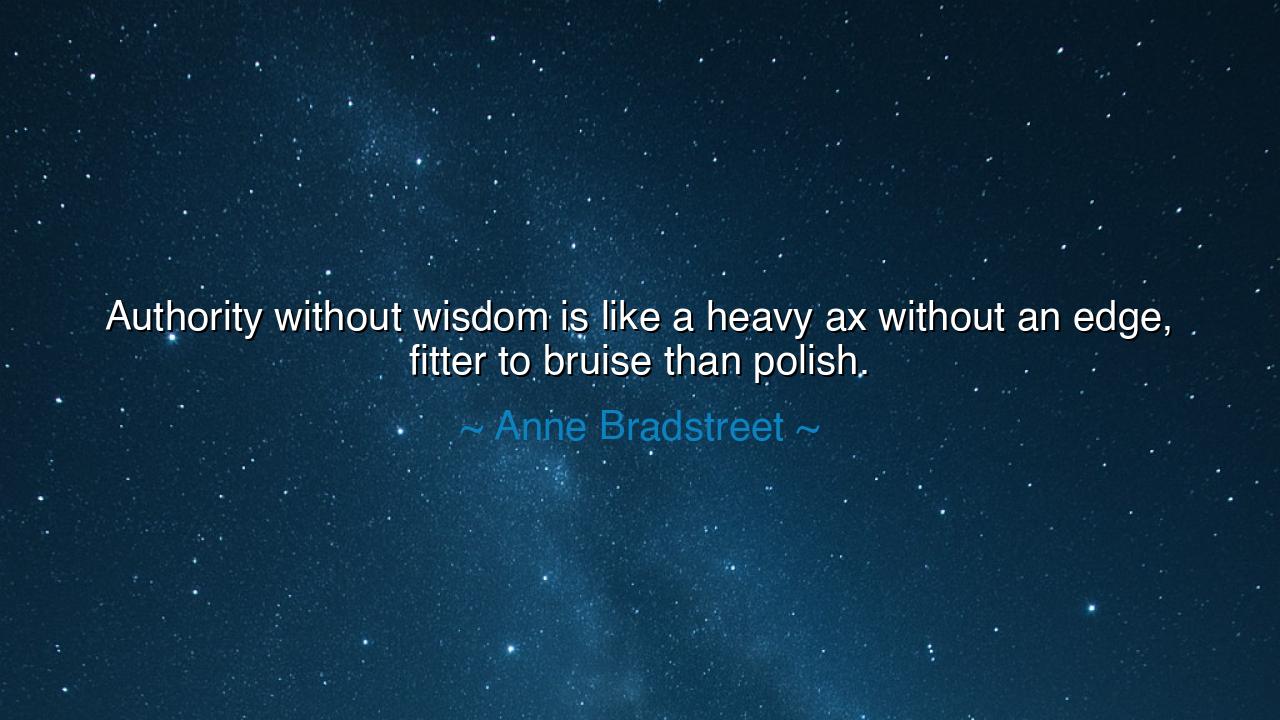
Authority without wisdom is like a heavy ax without an edge
Authority without wisdom is like a heavy ax without an edge, fitter to bruise than polish.






Anne Bradstreet, poet of the New World and voice of rare clarity, declares: “Authority without wisdom is like a heavy ax without an edge, fitter to bruise than polish.” In these words she lays bare a truth as old as thrones and empires: that authority, unguided by wisdom, becomes a tool of harm. Power without discernment cannot refine, cannot uplift, cannot shape—it can only strike clumsily, leaving wounds where it might have brought order and beauty.
The ancients saw this truth with sorrow. King Rehoboam, son of Solomon, inherited his father’s throne but not his father’s wisdom. When his people sought mercy, he answered with harshness, trusting in the strength of his authority rather than the edge of discernment. His cruelty split the kingdom of Israel in two, proving Bradstreet’s warning: a heavy ax, without edge, may shatter, but it cannot build.
History gives us many such examples. Napoleon Bonaparte, gifted with immense power, once sought to polish Europe with laws and reform. Yet as his ambition outgrew his judgment, his authority turned blunt, bruising nations with endless war. His downfall came not from lack of force, but from lack of restraint and wisdom. Thus, the ax that might have shaped history with balance became a weapon of destruction.
Yet Bradstreet’s words also teach hope. For just as an ax can be sharpened, so can authority be honed by counsel, humility, and knowledge. Abraham Lincoln bore immense power during America’s civil war, yet he wielded it with patience and wisdom, polishing the Union rather than crushing it. His authority was edged with mercy and foresight, and thus he healed where another might have only bruised.
Let this truth be carried forward: authority alone is not enough. It is the sharpening of that authority with wisdom that makes power fruitful, turning raw force into an instrument of justice and renewal. For the strong arm without a discerning mind is a danger to all, but the ruler whose authority is edged with wisdom may carve a legacy of peace and beauty that endures beyond his time.






AHAnh Huynh
I find myself pondering the broader societal implications. If authority is widespread but wisdom is rare, how does that affect social stability, justice, and progress? Could democratic processes, public scrutiny, or collaborative leadership models mitigate the dangers of unwise authority? It also raises personal questions: how can individuals recognize when those in power are acting without wisdom, and what strategies are effective for influencing or countering leadership that risks harm rather than benefit?
LVChuong Luong Van
This statement makes me consider the difference between authority and effectiveness. Can formal power alone achieve anything meaningful if it lacks the guiding principle of wisdom? It also brings to mind questions about education and mentorship: should aspiring leaders be trained not just in procedures and rules but in ethical reasoning, critical thinking, and empathy to avoid becoming the metaphorical bruising ax? How do societies cultivate wisdom alongside authority to maximize positive influence?
NHngan ha
Reading this, I feel a tension between the allure of power and the necessity of discernment. How often are leaders promoted based on charisma or strength rather than judgment and prudence? I also wonder about historical and contemporary examples where authority was exercised recklessly, resulting in harm, versus those where wisdom tempered power to create beneficial outcomes. It prompts reflection on the mechanisms that can prevent the misuse of authority while encouraging responsible leadership.
MDMai My Duyen
I’m intrigued by the metaphor of the unsharpened ax. Does this imply that authority without wisdom inevitably causes harm, even if intentions are good? How can organizations or societies ensure that those in positions of influence are not only empowered but also educated, experienced, and morally guided? It also raises questions about the balance between decisiveness and understanding: can someone be authoritative and effective without deep insight, or is wisdom always a prerequisite for positive impact?
NNBui Tran Nhat Nam
This quote makes me reflect on the dangers of leadership without insight or understanding. How often do we see positions of power misused simply because the authority figure lacks wisdom? I also wonder about the role of accountability and checks on power—can structures, laws, or cultural norms compensate when authority is unwise? Furthermore, it prompts me to consider whether wisdom can be cultivated in leaders or if some individuals are inherently more equipped to wield power effectively.